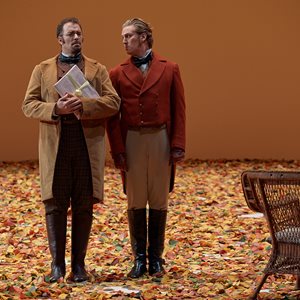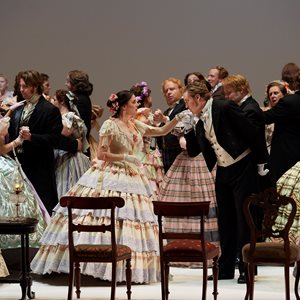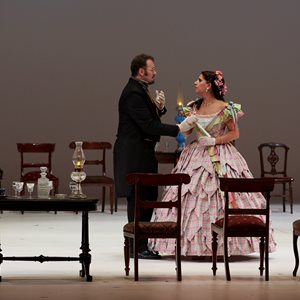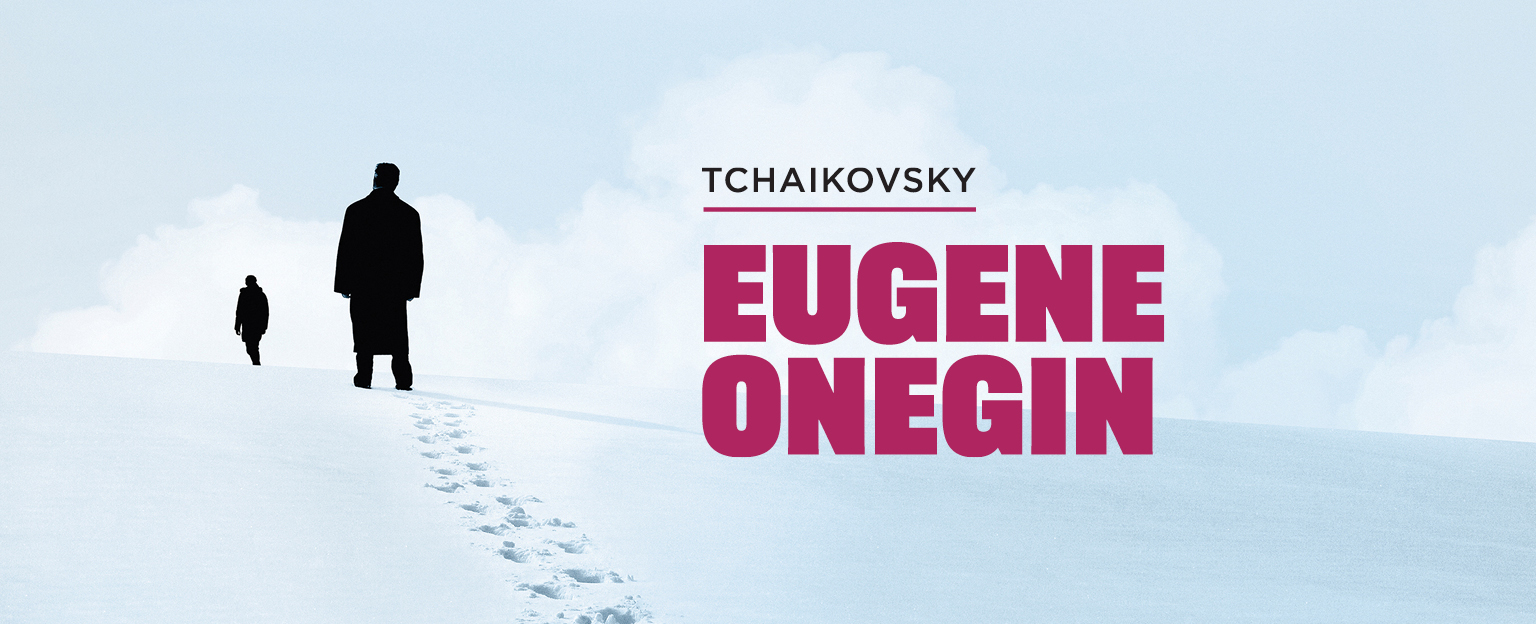Eugene Onegin
Pyotr Ilyich TchaikovskyDates are unavailable at the moment
MAY 2, 4, 7, 9, 15, 17, AND 24, 2025
Four Seasons Centre for the Performing Arts
Buy now as part of our 2024/25 Subscription Package!
Tchaikovsky’s Eugene Onegin is one of opera’s most romantic masterpieces, an aching meditation on happiness undone. Canadian director Robert Carsen’s stunningly simple staging enjoys an international reputation as “a piece of contemporary operatic history” (The Globe and Mail) and returns to the COC for the first time since 2018.
Speranza Scappucci conducts Tchaikovsky’s adored lyric opera, with soprano Lauren Fagan starring as Tatyana, who falls in love with the dashing Eugene Onegin (Vassily Ladyuk) at first sight.
CAST AND CREATIVE TEAMS
Conductor: Speranza Scappucci
Original Director: Robert Carsen
Revival Director: Peter McClintock
Original Set and Costume Designer: Michael Levine
Original Lighting Designer: Jean Kalman
Revival Lighting Designer: Christine Binder
Original Choreographer: Serge Bennathan
Price Family Chorus Master: Sandra Horst
Eugene Onegin: Andrii Kymach
Tatyana: Lauren Fagan
Lensky: Evan LeRoy Johnson
Olga: Niamh O'Sullivan
Gremin: Dimitry Ivashchenko
Madame Larina: Krisztina Szabó
Filipyevna: Deborah Nansteel
Monsieur Triquet: Michael Colvin
With the COC Orchestra and Chorus
Production premiered by the Metropolitan Opera in New York City on March 13, 1997. All scenery, properties, and costumes constructed by the Metropolitan Opera Shops.
Speranza Scappucci is generously sponsored by The Tauba and Solomon Spiro Family Foundation
SYNOPSIS IN A MINUTE
In a deeply emotional letter, the young Tatyana declares her love to the proud Onegin, who rejects her. After killing his friend Lensky in a duel, Onegin travels the world to try and escape his regret. When he meets Tatyana years later, he realizes he loves her, but it is too late. Tatyana is now married and even though she still loves Onegin, it is her turn to reject him.
FULL SYNOPSIS
ACT I
Scene I
At the Larin country estate, the widowed Madame Larina lives quietly with her two daughters, the vivacious Olga and the dreamy and reserved Tatyana. Lensky, a poet and Olga’s suitor, comes to visit and brings his new neighbor Onegin to meet the family. Tatyana is instantly struck by Onegin, believing him to be the one she has been waiting for.
Scene II
Tatyana cannot sleep and asks her old nurse Filpyevna to tell her about her own youth and marriage. After dismissing Filpyevna, Tatyana pours out her overwhelming feelings in a letter for Onegin. As dawn breaks, she gives the letter to Filpyevna to have delivered.
Scene III
The women of the estate are picking fruit and singing. They move along and Tatyana enters, remorseful about her letter. Onegin enters. He tells her that while her candor has touched him, he is not meant for marriage—a union between them would only bring mutual unhappiness and misery. His love for her is like a brother, and he warns her to control her feelings in the future, as not all men might be so understanding.
ACT II
Scene I
A ball is underway at the Larin estate to celebrate Tatyana’s name day. Neighbours gossip about Tatyana and Onegin; angered by this, and resenting Lensky for insisting that he attend, Onegin monopolizes Olga’s attention, which angers Lensky. Monsieur Triquet, the French master at a neighbour’s house, sings some verses that he has composed in honour of Tatyana. Lensky accuses Onegin of flirting with Olga and of being a disloyal friend. The argument escalates and Lensky challenges Onegin to a duel.
INTERMISSION
Scene II
It is barely dawn and Lensky and Zaretsky, his second, await Onegin at the site of the duel. Lensky sings of his lost innocence, his love for Olga, and his impending death. Onegin arrives with Monsieur Guillot, his second. As the men prepare to fight, they sing regretfully of their lost friendship. However the duel proceeds and Lensky falls, dead. Onegin is devastated.
ACT III
Scene I
It is several years later and Onegin has been trying to escape his unhappiness with travel. Now he has returned to St. Petersburg and is attending a ball. Prince Gremin enters with Tatyana on his arm. Onegin asks the prince, a relation, who she is. The prince tells him that she is his wife—in old age he has found love. Prince Gremin presents Tatyana to Onegin. Onegin is stunned to recognize the same girl he scorned in the past is now a beautiful and cultured woman. Tatyana manages to hide her intense emotion at this reunion and complains of tiredness; she and her husband leave the ball.
Scene II
Onegin has written to Tatyana declaring his love. He arrives at her home and begs forgiveness from her. She reminds him of his treatment of her in the past and how happy they might have been. She begs him to leave; he refuses, passionately declaring his love for her. Tatyana admits to Onegin that she still loves him, but duty bids her to remain with her husband. She bids him farewell and leaves. Onegin is left alone, in despair.



Born in Votkinsk, Russian Empire on May 7, 1840;
died in Saint Petersburg, Russian Empire on November 6, 1893
Peter Ilyich Tchaikovsky enjoyed tremendous fame during his lifetime as a composer of symphonic music and ballets. His operas have achieved a steadily growing popularity outside of Russia. The libretto for Eugene Onegin was largely put together by the composer himself, with help from his brother Modest (1850–1916) and others. The source of the libretto is the mock-epic poem of the same name by Pushkin (1799–1837), whose position in Russian literature can be compared only to that of Shakespeare in English. Pushkin’s body of work is marked by a wide range of tone and style, and his writings have been the source of many other Russian operas of note (such as Boris Godunov and Le Coq d’Or). Tchaikovsky specifically chose the most emotional and dramatic moments from Pushkin’s poem and called his work “lyric scenes,” emphasizing the episodic, rather than the strictly narrative, nature of his libretto.
Born in Moscow, Russian Empire on June 6, 1799;
died in Saint Petersburg, Russian Empire on February 10, 1837
Alexander Sergeyevich Pushkin was born in 1799 in Moscow into a cultured but poor aristocratic family. On his father’s side, he was a descendant of an ancient noble family and on his mother’s, he was a great-great-grandson of Abraham Hannibal, who served under Peter the Great (and about whom Pushkin wrote in his tale: The Moor of Peter the Great). He was brought up by Russian nursemaids and French tutors and governesses, from whom he learned to speak and write French at a very early age. He learned Russian from household serfs and from his nanny. The influence of his studies of French and English literature, and in particular Voltaire, Shakespeare, and Byron, and his deep attachment to the Russian countryside and its legends and fairy tales are clearly felt in his literary output.
Pushkin’s first major work was Ruslan and Ludmilla (1820), a kind of fairy tale in verse based on Russian folk tales told to him by his grandmother (in French!). His most important works include Eugene Onegin, a novel in verse; the verse dramas Boris Godunov, Poltava, The Bronze Horseman, Mozart and Salieri; the poem The Gypsies; and the prose works, The Captain’s Daughter, and The Queen of Spades.
Pushkin was killed in duel in St. Petersburg at the age of 38 defending the honour of his wife.
-
Sung in Russian with English SURTITLESTM
CAST AND CREATIVE TEAMS
Conductor: Speranza Scappucci
Original Director: Robert Carsen
Revival Director: Peter McClintock
Original Set and Costume Designer: Michael Levine
Original Lighting Designer: Jean Kalman
Revival Lighting Designer: Christine Binder
Original Choreographer: Serge Bennathan
Price Family Chorus Master: Sandra Horst
Eugene Onegin: Andrii Kymach
Tatyana: Lauren Fagan
Lensky: Evan LeRoy Johnson
Olga: Niamh O'Sullivan
Gremin: Dimitry Ivashchenko
Madame Larina: Krisztina Szabó
Filipyevna: Deborah Nansteel
Monsieur Triquet: Michael Colvin
With the COC Orchestra and Chorus
Production premiered by the Metropolitan Opera in New York City on March 13, 1997. All scenery, properties, and costumes constructed by the Metropolitan Opera Shops.
Speranza Scappucci is generously sponsored by The Tauba and Solomon Spiro Family Foundation -
SYNOPSIS IN A MINUTE
In a deeply emotional letter, the young Tatyana declares her love to the proud Onegin, who rejects her. After killing his friend Lensky in a duel, Onegin travels the world to try and escape his regret. When he meets Tatyana years later, he realizes he loves her, but it is too late. Tatyana is now married and even though she still loves Onegin, it is her turn to reject him.
FULL SYNOPSIS
ACT I
Scene I
At the Larin country estate, the widowed Madame Larina lives quietly with her two daughters, the vivacious Olga and the dreamy and reserved Tatyana. Lensky, a poet and Olga’s suitor, comes to visit and brings his new neighbor Onegin to meet the family. Tatyana is instantly struck by Onegin, believing him to be the one she has been waiting for.
Scene II
Tatyana cannot sleep and asks her old nurse Filpyevna to tell her about her own youth and marriage. After dismissing Filpyevna, Tatyana pours out her overwhelming feelings in a letter for Onegin. As dawn breaks, she gives the letter to Filpyevna to have delivered.
Scene III
The women of the estate are picking fruit and singing. They move along and Tatyana enters, remorseful about her letter. Onegin enters. He tells her that while her candor has touched him, he is not meant for marriage—a union between them would only bring mutual unhappiness and misery. His love for her is like a brother, and he warns her to control her feelings in the future, as not all men might be so understanding.
ACT II
Scene I
A ball is underway at the Larin estate to celebrate Tatyana’s name day. Neighbours gossip about Tatyana and Onegin; angered by this, and resenting Lensky for insisting that he attend, Onegin monopolizes Olga’s attention, which angers Lensky. Monsieur Triquet, the French master at a neighbour’s house, sings some verses that he has composed in honour of Tatyana. Lensky accuses Onegin of flirting with Olga and of being a disloyal friend. The argument escalates and Lensky challenges Onegin to a duel.
INTERMISSION
Scene II
It is barely dawn and Lensky and Zaretsky, his second, await Onegin at the site of the duel. Lensky sings of his lost innocence, his love for Olga, and his impending death. Onegin arrives with Monsieur Guillot, his second. As the men prepare to fight, they sing regretfully of their lost friendship. However the duel proceeds and Lensky falls, dead. Onegin is devastated.
ACT III
Scene I
It is several years later and Onegin has been trying to escape his unhappiness with travel. Now he has returned to St. Petersburg and is attending a ball. Prince Gremin enters with Tatyana on his arm. Onegin asks the prince, a relation, who she is. The prince tells him that she is his wife—in old age he has found love. Prince Gremin presents Tatyana to Onegin. Onegin is stunned to recognize the same girl he scorned in the past is now a beautiful and cultured woman. Tatyana manages to hide her intense emotion at this reunion and complains of tiredness; she and her husband leave the ball.
Scene II
Onegin has written to Tatyana declaring his love. He arrives at her home and begs forgiveness from her. She reminds him of his treatment of her in the past and how happy they might have been. She begs him to leave; he refuses, passionately declaring his love for her. Tatyana admits to Onegin that she still loves him, but duty bids her to remain with her husband. She bids him farewell and leaves. Onegin is left alone, in despair. -



-
Pyotr Ilyich Tchaikovsky
Born in Votkinsk, Russian Empire on May 7, 1840;
died in Saint Petersburg, Russian Empire on November 6, 1893
Peter Ilyich Tchaikovsky enjoyed tremendous fame during his lifetime as a composer of symphonic music and ballets. His operas have achieved a steadily growing popularity outside of Russia. The libretto for Eugene Onegin was largely put together by the composer himself, with help from his brother Modest (1850–1916) and others. The source of the libretto is the mock-epic poem of the same name by Pushkin (1799–1837), whose position in Russian literature can be compared only to that of Shakespeare in English. Pushkin’s body of work is marked by a wide range of tone and style, and his writings have been the source of many other Russian operas of note (such as Boris Godunov and Le Coq d’Or). Tchaikovsky specifically chose the most emotional and dramatic moments from Pushkin’s poem and called his work “lyric scenes,” emphasizing the episodic, rather than the strictly narrative, nature of his libretto. -
Alexander Pushkin
Born in Moscow, Russian Empire on June 6, 1799;
died in Saint Petersburg, Russian Empire on February 10, 1837
Alexander Sergeyevich Pushkin was born in 1799 in Moscow into a cultured but poor aristocratic family. On his father’s side, he was a descendant of an ancient noble family and on his mother’s, he was a great-great-grandson of Abraham Hannibal, who served under Peter the Great (and about whom Pushkin wrote in his tale: The Moor of Peter the Great). He was brought up by Russian nursemaids and French tutors and governesses, from whom he learned to speak and write French at a very early age. He learned Russian from household serfs and from his nanny. The influence of his studies of French and English literature, and in particular Voltaire, Shakespeare, and Byron, and his deep attachment to the Russian countryside and its legends and fairy tales are clearly felt in his literary output.
Pushkin’s first major work was Ruslan and Ludmilla (1820), a kind of fairy tale in verse based on Russian folk tales told to him by his grandmother (in French!). His most important works include Eugene Onegin, a novel in verse; the verse dramas Boris Godunov, Poltava, The Bronze Horseman, Mozart and Salieri; the poem The Gypsies; and the prose works, The Captain’s Daughter, and The Queen of Spades.
Pushkin was killed in duel in St. Petersburg at the age of 38 defending the honour of his wife.
2024/2025 season creative: BT/A

